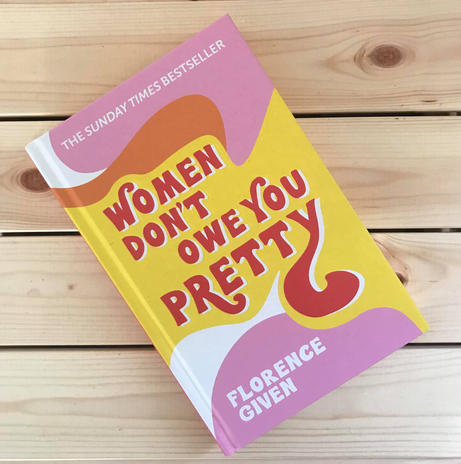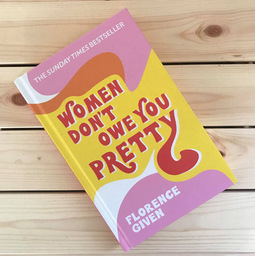Review of Florence Given’s Women Don’t Owe You Pretty
Reading Florence Given’s first book Women Don’t Owe You Pretty was honestly revolutionary. This book is so many things rolled into one, it’s an easy, accessible introduction to intersectional feminism, while also being a life guide and in some parts, an autobiography. It’s brutally honest, in the best way, and will make you reconsider literally everything, as Florence puts so well: ‘Feminism is going to ruin your life (in the best way possible)’. It’s no surprise that it became a Sunday Times bestseller shortly after it was published, and received praise from Cosmopolitan as ‘a fearless book’ and from Glamour for being ‘an incredible mouthpiece for modern intersectional feminism’. I’m hoping that after reading this article you’ll be heading straight to your local bookstore to purchase this incredible work, if you haven’t already.
One of the things that marked me the most about this book is how easy it is to read. Too often I’ve come across feminist literature that is so wordy and over complicated that the message is completely lost. I think it’s so important that we strive to make feminism accessible for absolutely everyone, if it’s not understood, how can we expect people to support it? Now I am aware that there’s much more to be done than just writing an accessible book for this to happen, but it’s certainly a step in the right direction. Given’s work is accessible in many different ways, particularly in the language and vocabulary she chooses to use. Naturally she employs terms such as ‘intersectional feminism’, ‘patriarchy’ and ‘internalised misogyny’, but she’s quick to explain these terms which may be foreign to someone just beginning their feminist journey. She also manages to make a topic, which can be very serious and academic, rather light-hearted and even amusing at times. When I say this, I think in particular of the imagined conversion between Florence and her younger self which takes place in the introduction. This passage is comedic but still enables her to present some really important ideas, such as confronting our own internalised misogyny.
Another thing that I found absolutely great about this book is that Florence doesn’t shame people for not being perfect feminists. By sharing her own feminist evolution, she reassures her readership that it is natural to make mistakes and to have made mistakes in the past. Instead of condemning them, she shows them that change is possible and even advises them on how to kick start that change. The narration of the book is so personal and caring that it makes you feel as if Florence is a true friend whose end goal is just to help you become the best version of yourself.
For such an aesthetically pleasing book, (seriously the prettiest book I have ever seen!) the message inside is very different. As the title suggests, Florence tackles the complicated subject of beauty standards and how they affect, and really ruin, our day to day lives. This book will teach you to recognise how so many of the beauty rituals you perform come straight from society’s ridiculous expectations. The author also explains how these beauty standards, which are quite literally man-made, don’t just affect the way you treat yourself but also the way you treat other women. She explains how pretty privilege works in, what I thought was, a brilliant way saying: ‘ Whether I thought I was attractive or not, for the first time I had to acknowledge the fact that I sit high on society’s scale of desirability, by being slim, non-disabled and white’ (p. 10). She has a way of making the most sensitive and complicated subjects seem so straightforward, but without oversimplifying it either. I found this again in her fifth chapter entitled ‘Refuse to find comfort in other women’s flaws’. If anything, I’d argue that this is the chapter which marked me the most. Whether we admit it to ourselves or not, I genuinely believe we have all been guilty of treating other women poorly at some point. Too often women tear each other down when all we should be doing is building each other up. We already have the patriarchy making our lives a nightmare no need to add to that!
Although, it’s impossible for me to cover everything Florence gets into in her book, let alone to be able to explain it in a way that is deserving of how good it is, I hope that if anything this will have made you want to read it. Don’t be mistaken, this book will bring up some tricky subjects that you may not want to address, but by all means don’t let that put you off because the ultimate conclusion that I came to, and one I think the author would approve of, is that the most important thing is to love yourself, no more looking for satisfaction in other people, you are more than enough.



